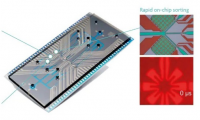-
Eight commonly used immune cell therapies open up a new era of healthcare
- Source: drugdu
- 72
- October 26, 2024
-
Seven domestic companies have completed a new round of financing, focusing on the fields of cell and gene therapy
- Source: drugdu
- 112
- October 3, 2024
-
Can Increased Investment in Cell Therapy Drive CAR-T Product Growth?
- Source: drugdu
- 94
- September 21, 2024
-
New study suggests CAR-T therapy monitoring time could be slashed
- Source: drugdu
- 85
- July 26, 2024
-
AstraZeneca Finalizes Equity Investment, Research Collaboration with Cellectis
- Source: drugdu
- 105
- May 9, 2024
-
Groundbreaking Test Monitors Radiation Therapy Toxicity in Cancer Patients
- Source: drugdu
- 129
- March 20, 2024
-
Hemogenyx gets reprieve as FDA lifts clinical hold on AML CAR-T therapy
- Source: https://www.pharmaceutical-technology.com/news/hemogenyx-gets-reprieve-as-fda-lifts-clinical-hold-on-aml-car-t-therapy/?cf-view
- 155
- February 15, 2024
-
Hemogenyx gets reprieve as FDA lifts clinical hold on AML CAR-T therapy
- Source: drugdu
- 139
- February 10, 2024
-
Cell Sorter Chip Technology to Pave Way for Immune Profiling at POC
- Source: drugdu
- 91
- February 7, 2024
your submission has already been received.
OK
Subscribe
Please enter a valid Email address!
Submit
The most relevant industry news & insight will be sent to you every two weeks.













